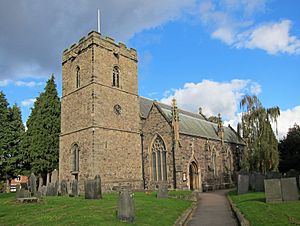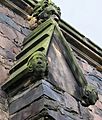St Mary's Church, Anstey facts for kids
Quick facts for kids St Mary's Church, Anstey |
|
|---|---|

The Church viewed from the South-west
|
|
| 52°40′19″N 1°11′20″W / 52.6720°N 1.1888°W | |
| Country | England |
| Denomination | Church of England |
| History | |
| Founded | 14th century |
| Specifications | |
| Materials | Mountsorrel granite & Swithland slate |
| Bells | 8 |
| Administration | |
| Parish | Anstey, Leicestershire |
| Diocese | Leicester |
St Mary's Church is a special Church of England church in Anstey, Leicestershire. It is a parish church, which means it serves the local community. The church is part of the Diocese of Leicester.
Contents
About St Mary's Church
The church is located in the very old, medieval part of Anstey village. It is built from strong local stones like Mountsorrel granite and Swithland slate. The roof is made of Westmorland slate.
History of the Building
St Mary's Church is very old, first built around the 14th or 15th century (the 1300s or 1400s). It has some Norman architecture features. A lot of the church was rebuilt between 1845 and 1846. This work cost £4,000 and was paid for by the church leader at the time, Revd. Richard Waterfield.
You can still see an old Norman doorway on the north side of the church. Some of the stone carvings, called gargoyles, on three sides of the church are from an even older time, known as the Early English period. St Mary's Church is a Grade II listed building. This means it is an important historical building that needs to be protected. Records show that in 1220, a small chapel in Anstey was connected to the church in Thurcaston. Anstey became its own parish in 1867.
Inside the Church
The church has beautiful stained-glass windows. Some of these windows are memorials. They remember people like Revd. Richard Waterfield and Elliot John Norman Galer. There is also a window that honors those who died in World War I.
The church tower holds eight bells. One of these bells has a very special message. It says "Recast in the year of the accession of King Edward VIII". This is believed to be the only bell in Britain with this exact message. King Edward VIII had a very short reign, which makes this inscription unique. The church organ was built in 1926 by Taylors of Leicester. There is also a clock in the south wall of the tower. It was made by W. Jolley of Leicester and was given to the church in 1772.
- Take a closer look at some of the interesting carvings and features of St Mary's Church.
The Churchyard
The area around the church is called the churchyard. It is also home to some historical items.
Heard Family Tombs
In the churchyard, you can find the Heard Family tombs. These tombs are also Grade II listed buildings. They were built in 1740 and 1803. The headstones next to them are from 1739 and 1743.
Ancient Cross
The churchyard also has parts of a very old cross from the 15th century. You can see the base stone and part of the tall shaft. This cross is also a Grade II listed building and a scheduled monument. This means it is a nationally important archaeological site.
Churchyard Wall
The wall that goes around the churchyard on three sides is also a Grade II listed building. It helps protect the church and its historic grounds.
 | Dorothy Vaughan |
 | Charles Henry Turner |
 | Hildrus Poindexter |
 | Henry Cecil McBay |






